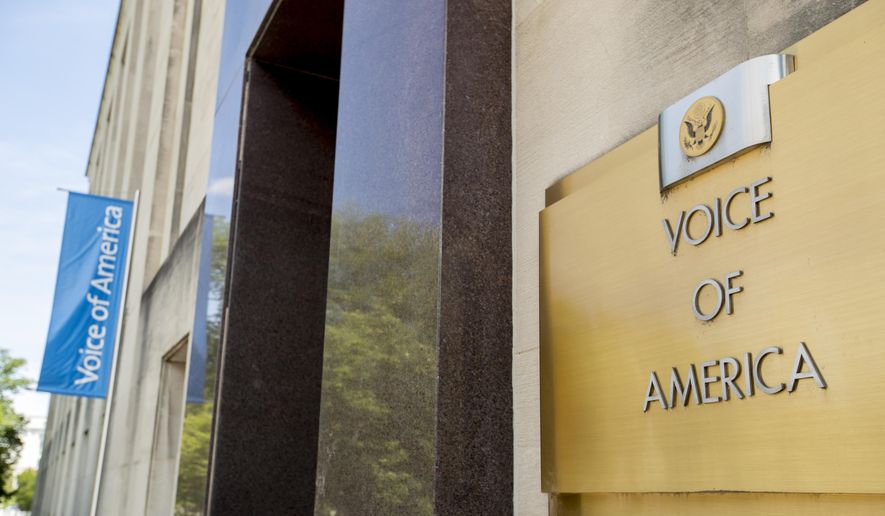The director of the Voice of America and her top deputy resigned Monday following the recent Senate confirmation of the Trump administration’s pick to oversee all U.S. government broadcasting.
Director Amanda Bennett and Sandy Sugawara, deputy VOA director, notified Michael Pack, the new chief executive officer for the U.S. Agency for Global Media, of the resignations Monday, a VOA spokeswoman said. The agency is the umbrella organization that oversees VOA.
Mr. Pack, a conservative documentary filmmaker, “has the right to replace us with his own VOA leadership,” the two said in a letter also posted on Twitter. “We depart with the gratitude and joy that has marked our time together, with a dedication to our mission and admiration for each one of you.”
VOA has come under fire from senior Trump administration officials and outside critics for its what they say is its often “soft news” approach to official U.S. broadcasts.
In April, the White House issued an unusual attack on VOA, accusing the global broadcaster of misusing taxpayer money in its operations. The VOA “too often speaks for America’s adversaries — not its citizens,” the White House said.
The Washington Times reported March 5 that the administration is planning a major overhaul of official broadcasting under Mr. Pack, including replacing Ms. Bennett, a Pulitzer Prize-winning former journalist, a holdover from the Obama administration and the wife of former Washington Post publisher Donald E. Graham.
“After decades of kowtowing to [China], Amanda Bennett resigned before being summarily fired,” said former White House strategist Steve Bannon. “Now patriots can begin the process of cleaning up the mess she leaves behind.”
The VOA overhaul also will include restructuring and personnel changes at Radio Free Europe/Radio Liberty, Radio Free Asia, Radio and Television Marti and several Middle East broadcast outlets, according to officials familiar with the plans.
Another radio director slated for replacement is the recently appointed head of Radio Free Asia, Bay Fang, a former principal at the lobbying firm The Podesta Group, which at the time was run by the brother of firm co-founder John Podesta, a close friend of former President Bill Clinton and former Secretary of State Hillary Clinton. John Podesta was no longer at the firm when Ms. Fang was employed there.
Critics say VOA broadcasts, in a bid to follow private news fairness guidelines, have produced reports critical of the Trump administration’s hardline immigration policies. VOA also has cut back on producing hard news and instead has tended to produce “fluff journalism” — soft news and entertainment that lacks focus.
Mr. Pack’s nomination to the new CEO post had been held up by Senate Democrats for nearly three years. He was confirmed for the post by the full Senate on June. 4. The U.S. government broadcasting system receives about $800 million annually, including about $219 million for VOA.
An administration official familiar with VOA said Ms. Bennett and Ms. Sugawara resigned in anticipation of being let go by Mr. Pack.
“Bennett suffered from her mistaking VOA for just any other news agency out there, and fell victim to a broad scheme to discredit VOA and thus weaken the [U.S. government],” the official said. “VOA had been flawed and failing long before her arrival.”
The official said the current VOA leadership was behind the plan to shift programming from hard news to soft news features, including broadcasts into China, the official said. For example, VOA recently proposed a new initiative called “Global Mandarin” that strictly focuses on soft broadcasts.
“Why on earth would VOA programming set the tone that the network should only focus on delivering soft content to Chinese audiences?” the official asked, noting that official propaganda outlets already are providing that.
VOA operations were also hampered by outdated technology, and an internal review conducted under Ms. Bennett said there was “widespread confusion” about VOA’s mission and criticized the content of some of its reporting.
“Opinion had crept into news stories, which were sometimes unbalanced and biased,” the report said.
The report said VOA over the past four years has transformed the radio by refocusing its mission.
“VOA refocused on its core charter mission: Bringing objective news and information to those without a free press; telling America’s story; explaining America’s government and policies to the world; representing all of the U.S. and not just one portion of the U.S.”
Despite the turmoil, VOA’s worldwide audience grew in the past three years by 19% to 280.9 million viewers, listeners or readers. Its online audience increased by 153% to 87.1 million people.
• Ms. Fang has never declared a party affiliation. The original version of this story said she was a Democrat and has been corrected.
• Bill Gertz can be reached at bgertz@washingtontimes.com.




Please read our comment policy before commenting.